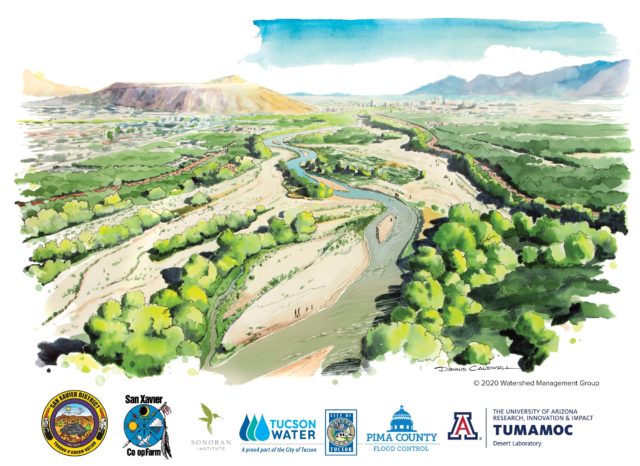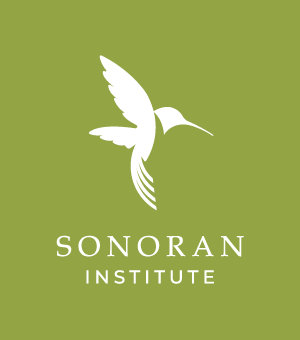Various dates
6-7:30 PM
VIRTUAL EVENTS
FREE
 Past, Present, and Future of the Santa Cruz River Heritage Reach
Past, Present, and Future of the Santa Cruz River Heritage Reach
The Santa Cruz River was the life blood of the earliest human settlements in Tucson (Chukshon, O’odham, Black Base) but today has been downcut, drained, channelized, cemented, and ignored. Yet, innovative thinking and actions are working to reverse this trend and revitalize the Santa Cruz river where it once flowed perennially at the base of Tumamoc Hill, reinvigorating a lush ecosystem, the local watershed, and sense of place. This lecture series will explore how the river has coursed through the history of people in this region and how it can continue to do so into the future.
The above watercolor is one of six illustrations commissioned by Watershed Management Group to illustrate their 50-year vision of restoring Tucson’s heritage of flowing rivers. See them all!
All presentations are free, begin at 6 pm, and will be hosted via Zoom. Registration is required. Please click on the links below to register for each presentation.
A Perspective of the Santa Cruz River from the San Xavier District
September 23, 6 pm
Julie Pierson, San Xavier District Community Member and President of the Board of Directors, San Xavier Cooperative Association Farm
Gabriel Vega, San Xavier Cooperative Association Farm Manager
The Santa Cruz River Valley is one of the longest inhabited regions of North America. Water in the desert is a magnet for life that sustains and creates. Understanding the river from those who have known it the longest is essential for all that comes next, especially in charting a path that heals the wounds inflicted and reconnects with the ways water can continue to support life in the desert.
Past Informing the Present
October 14, 6 pm
Bob Webb, School of Natural Resources and the Environment and Department of Hydrology and Atmospheric Physics, University of Arizona
The past 100 years have brought remarkable change to the Santa Cruz River. From a perennial reach with a magnificent riparian gallery forest and broad mesquite bosques to a down cut, cemented channel that has been an afterthought of planning and development for decades. What happened that led to these changes? Taking a long-term look at the Santa Cruz using a number of tools and data sets, Dr. Bob Webb will put these changes into perspective and help assess where the river is today and how it got there.
Art of the Santa Cruz
November 11, 6 pm
Kimi Eisele
Kathleen Velo
Dennis Caldwell
As the life blood of Tucson, the Santa Cruz River courses through our sense of place. These three artists have captured that vibrancy in distinct ways, each addressing themes of change, restoration, resiliency, and possibility. What can art teach and tell us about the river and what is possible? We will learn answers to these questions and more by hearing each artist’s approach and then sharing perspectives and insights through a roundtable discussion.
Science and Management: To Today
December 2, 6 pm
Michael Bogan, School of Natural Resources and the Environment, University of Arizona
Maya Teyechea, Tucson Water
Dick Thompson, Tucson Water
We are at a critical point in time in the future of the Santa Cruz, especially in downtown Tucson. An awareness is growing that growth, development, and management that is based on a healthy river can create a bright future for our city. Can we create a perennially flowing river through downtown Tucson again? If so, do city, county, state, and federal regulations allow it? We will learn more about the recent Santa Cruz River Heritage Project of Tucson Water.
Science and Management: To Tomorrow
December 3, 6 pm
Chairman Austin Nunez, San Xavier District
Claire Zugmeyer, Sonoran Institute
Evan Canfield, Pima County Regional Flood Control District
What is the path of the possible? In this final lecture we learn from leaders in our community asking this question and finding the answers. Taking inspiration from the Santa Cruz River Heritage Project model and looking to the future to explore what is possible in reconnecting to our roots and making the Santa Cruz a healthy vibrant ecosystem at the core of Tucson once again.
